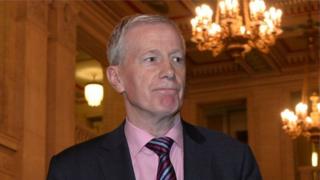 Image copyright Charles McQuillan
Image copyright Charles McQuillan
Talks aimed at breaking almost three years of political deadlock in Northern Ireland will continue on Monday.
The Stormont parties have until 13 January to reach a deal to restore power sharing or a new assembly election could be called.
NI has been without devolved government since January 2017, when the DUP and Sinn Féin split in a bitter row.
Over the weekend, the NI secretary met some of the parties and Irish language campaigners.
Proposed legislation for an Irish language act and reforming the petition of concern, the assembly’s controversial veto system, are among the key sticking points in the ongoing talks.

On Sunday, Irish language group Conradh na Gaeilge described its meeting with Secretary of State Julian Smith as “productive” and that it got “a fair hearing”.
The campaign group said there was no “legitimate justification for denying” Irish language legislation.

Analysis:
BBC News NI political reporter Jayne McCormack
The new year has yet to bring a political breakthrough, but as talks carry on, it’s thought a draft text could be published on Tuesday or Wednesday.
That doesn’t leave much time to iron out the details.
The deadline is just a week away. If an executive isn’t in place by then, Julian Smith has said he’ll call another election and few believe that’s an empty threat.
- Stormont stalemate: Varadkar and Johnson aim to restore executive
- Stormont deadlock – how things stand
- Power sharing: ‘Now is the moment’ to restore devolution
- Consequences of not restoring Stormont ‘profound’
There’s extra heat on the parties this week too: health care workers are set to hold two more days of strike action and Thursday marks the third anniversary of the executive’s collapse.
The pressure to restore Stormont is building.

On Sunday, DUP East Londonderry MP Gregory Campbell said the 13 January deadline “will be used as leverage to get any type of deal over the line as opposed to detailed consideration in order that a good deal is achieved”.
He added: “Whether it is one party making unacceptable demands, or other parties standing side by side to accept that the unreasonable demand is met, will make no difference to us.”
 Image copyright Pacemaker
Image copyright Pacemaker
Mr Campbell, who is opposed to an Irish language act, said the language “has a perfectly acceptable place in Northern Ireland society”.
“Where there is an unacceptable demand to elevate it above all other minority languages, whether it is Sinn Féin, other parties or HM government saying we will have to yield on this issue as it is preventing devolution returning, we will not do so.”
In a tweet, Sinn Féin chairperson and South Antrim MLA Declan Kearney described Mr Campbell’s remarks as “unionist rhetoric”.
Why is the talks deadline 13 January?
Since Stormont collapsed, civil servants have been running day-to-day operations – but have needed Westminster to pass some legislation for some areas they do not have powers over.
In July, the government extended a law that gives civil servants flexibility to take certain decisions, but that runs out on 13 January 2020.
 Image copyright Charles McQuillan
Image copyright Charles McQuillan
The government then has two options if devolution is still not restored: bring forward another new bill to push back the date, or call a fresh assembly election.
In the past, it has opted to pursue legislation but Mr Smith has insisted he will call another poll if the parties do not reach a breakthrough by 13 January.
Discussions were paused over the Christmas holidays after DUP was accused of holding up a deal.
Original Article : HERE ;
from MetNews https://metnews.pw/talks-to-end-ni-devolution-deadlock-continue/
No comments:
Post a Comment